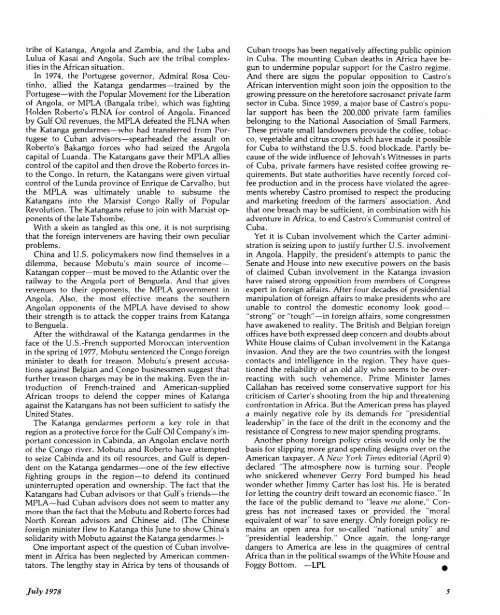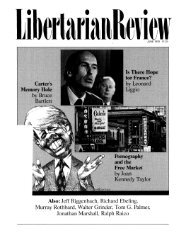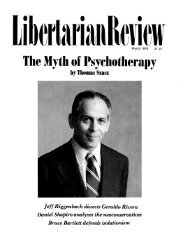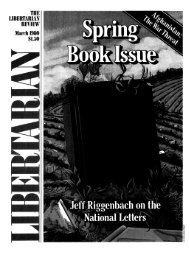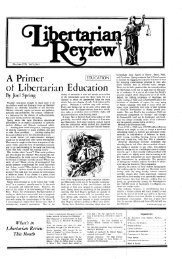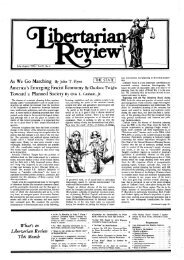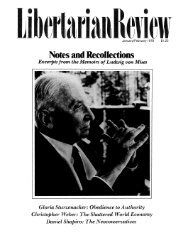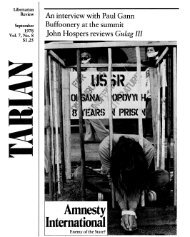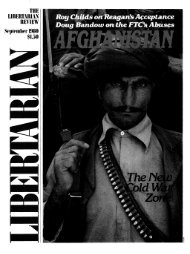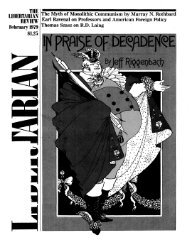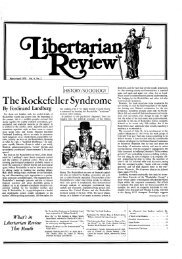The Libertarian Review July 1978 - Libertarianism.org
The Libertarian Review July 1978 - Libertarianism.org
The Libertarian Review July 1978 - Libertarianism.org
You also want an ePaper? Increase the reach of your titles
YUMPU automatically turns print PDFs into web optimized ePapers that Google loves.
tribe of Katanga, Angola and Zambia, and the Luba andLulua of Kasai and Angola. Such are the tribal complexitiesin the African situation.In 1974, the Portugese governor, Admiral Rosa Coutinho,allied the Katanga gendarmes-trained by thePortugese-with the Popular Movement for the Liberationof Angola, or MPLA (Bangala tribe), which was fightingHolden Roberto's FLNA for control of Angola. Financedby Gulf Oil revenues, the MPLA defeated the FLNA whenthe Katanga gendarmes-who had transferred from Portugeseto Cuban advisors-spearheaded the assault onRoberto's Bakarrgo forces who had seized the Angolacapital of Luanda. <strong>The</strong> Katangans gave their MPLA alliescontrol of the capitol and then drove the Roberto forces intothe Congo. In return, the Katangans were given virtualcontrol of the Lunda province of Enrique de Carvalho, butthe MPLA was ultimately unable to subsume theKatangans into the Marxist Congo Rally of PopularRevolution. <strong>The</strong> Katangans refuse to join with Marxist opponentsof the late Tshombe.With a skein as tangled as this one, it is not surprisingthat the foreign interveners are having their own peculiarproblems.China and U.S. policymakers now find themselves in adilemma, because Mobutu's main source of incomeKatangan copper-must be moved to the Atlantic over therailway to the Angola port of Benguela. And that givesrevenues to their opponents, the MPLA government inAngola. Also, the most effective means the southernAngolan opponents of the MPLA have devised to showtheir strength is to attack the copper trains from Katangato Benguela.After the withdrawal of the Katanga gendarmes in theface of the U.S.-French supported Moroccan interventionin the spring of 1977, Mobutu sentenced the Congo foreignminister to death for treason. Mobutu's present accusationsagainst Belgian and Congo businessmen suggest thatfurther treason charges may be in the making. Even the introductionof French-trained and American-suppliedAfrican troops to defend the copper mines of Katangaagainst the Katangans has not been sufficient to satisfy theUnited States.<strong>The</strong> Katanga gendarmes perform a key role in thatregion as a protective force for the Gulf Oil Company's importantconcession in Cabinda, an Angolan enclave northof the Congo river. Mobutu and Roberto have attemptedto seize Cabinda and its oil resources, and Gulf is dependenton the Katanga gendarmes-one of the few effectivefighting groups in the region-to defend its continueduninterrupted operation and ownership. <strong>The</strong> fact that theKatangans had Cuban advisors or that Gulf's friends-theMPLA-had Cuban advisors does not seem to matter anymore than the fact that the Mobutu and Roberto forces hadNorth Korean advisors and Chinese aid. (<strong>The</strong> Chineseforeign minister flew to Katanga this June to show China'ssolidarity with Mobutu against the Katanga gendarmes.)-One important aspect of the question of Cuban involvementin Africa has been neglected by American commentators.<strong>The</strong> lengthy stay in Africa by tens of thousands ofCuban troops has been negatively affecting public opinionin Cuba. <strong>The</strong> mounting Cuban deaths in Africa have begunto undermine popular support for the Castro regime.And there are signs the popular opposition to Castro'sAfrican intervention might soon join the opposition to thegrowing pressure on the heretofore sacrosanct private farmsector in Cuba. Since 1959, a major base of Castro's popularsupport has been the 200,000 private farm familiesbelonging to the National Association of Small Farmers.<strong>The</strong>se private small landowners provide the coffee, tobacco,vegetable and citrus crops which have made it possiblefor Cuba to withstand the U.S. food blockade. Partly becauseof the wide influence of Jehovah's Witnesses in partsof Cuba, private farmers have resisted coffee growing requirements.But state authorities have recently forced coffeeproduction and in the process have violated the agreementswhereby Castro promised to respect the producingand marketing freedom of the farmers' association. Andthat one breach may be sufficient, in combination with hisadventure in Africa, to end Castro's Communist control ofCuba.Yet it is Cuban involvement which the Carter administrationis seizing upon to justify further U. S. involvementin Angola. Happily, the president's attempts to panic theSenate and House into new executive powers on the basisof claimed Cuban involvement in the Katanga invasionhave raised strong opposition from members of Congressexpert in foreign affairs. After four decades of presidentialmanipulation of foreign affairs to make presidents who areunable to control the domestic economy look good"strong" or "tough"-in foreign affairs, some congressmenhave awakened to reality. <strong>The</strong> British and Belgian foreignoffices have both expressed deep concern and doubts aboutWhite House claims of Cuban involvement in the Katangainvasion. And they are the two countries with the longestcontacts and intelligence in the region. <strong>The</strong>y have questionedthe reliability of an old ally who seems to be overreactingwith such vehemence. Prime Minister JamesCallahan has received some conservative support for hiscriticism of Carter's shooting from the hip and threateningconfrontation in Africa. But the American press has playeda mainly negative role by its demands for "presidentialleadership" in the face of the drift in the economy and theresistance of Congress to new major spending programs.Another phony foreign policy crisis would only be thebasis for slipping more grand spending designs over on theAmerican taxpayer. A New York Times editorial (April 9)declared "<strong>The</strong> atmosphere now is turning sour. Peoplewho snickered whenever Gerry Ford bumped his headwonder whether Jimmy Carter has lost his. He is beratedfor letting the country drift toward an economic fiasco." Inthe face of the public demand to "leave me alone," Congresshas not increased taxes or provided the "moralequivalent of war" to save energy. Only foreign policy remainsan open area for so-called "national unity" and"presidential leadership." Once again, the long-rangedangers to America are less in the quagmires of centralAfrica than in the political swamps of the White House andFoggy Bottom. -LPL •<strong>July</strong> <strong>1978</strong>5


